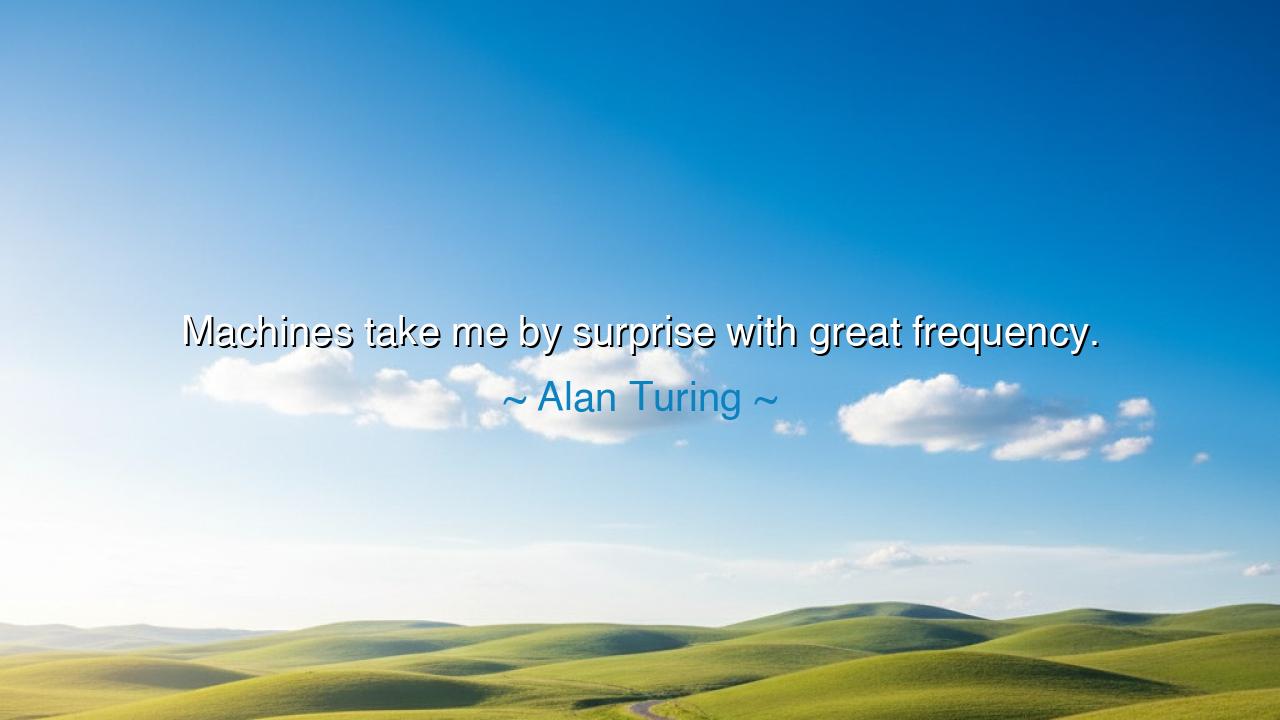
Machines take me by surprise with great frequency.






In the words of Alan Turing, “Machines take me by surprise with great frequency.” At first glance, these words sound like a gentle jest — a scientist amused by the inventions of his own making. Yet beneath their modesty lies a revelation of profound depth: that the mind of man, once reflected in his creations, can evolve beyond his own understanding. Turing, the father of computer science, was not merely speaking of machinery, but of the living mystery within human ingenuity — the awe that arises when creation begins to teach its creator. His surprise was not born of ignorance, but of wonder. It was the wonder of a thinker standing before the dawn of a new age, watching intelligence — once the sole domain of flesh and soul — begin to flicker within the circuits of metal and code.
The origin of this quote lies in Turing’s reflections on artificial intelligence and the potential of machines to imitate thought. In his time, the idea that a machine might “think” was met with disbelief, even mockery. Yet Turing, visionary and humble, knew that intelligence was not confined to biology. He saw that the patterns of logic, once written into the bones of silicon, could come alive in ways even their makers could not predict. His words, spoken with quiet amusement, reveal an essential truth: the act of creation often transcends the creator’s intent. Just as a poet is surprised by the meanings his own verse reveals, so too was Turing astonished by the behaviors, errors, and emergent beauty of his machines.
This truth, though modern in its form, is ancient in its essence. From the myth of Pygmalion, who sculpted a statue that came to life, to the legend of Frankenstein, who gave breath to lifeless matter, humankind has long wrestled with the mystery of its own creative power. We seek to command the forces of nature, yet in doing so, we awaken something beyond command — something unexpected. Turing’s “surprise” is the same wonder that artists, inventors, and dreamers have felt throughout history when confronted by the living consequence of their own work. It is the moment when invention ceases to be mere tool and becomes something with spirit, with unpredictability, with a reflection of ourselves that feels somehow new.
Consider the story of Turing himself during the war years. When he built the Bombe, a machine designed to decipher the secret codes of the German Enigma, he believed he was simply crafting a tool for logic. Yet the Bombe did more than calculate; it reasoned. It made connections faster and more intricately than any human mind could. It revealed truths hidden beneath layers of deception — and in doing so, it startled even its creator. Turing saw then that machines could do more than obey — they could surprise, discover, and reveal. This realization marked the birth of a new relationship between man and machine: no longer master and servant, but teacher and student, each capable of learning from the other.
In this way, Turing’s quote is not about technology alone. It is about the humility of genius — the recognition that every act of knowledge opens the door to mystery. The wise do not fear surprise; they welcome it, for it is proof that creation is alive. When Turing says machines “take him by surprise,” he is acknowledging the boundless nature of discovery itself. Every true explorer knows that wonder is not a sign of confusion, but of closeness to truth. Those who believe they fully understand their creations are blind; those who are surprised by them are awake.
And yet, there is also caution in his words. For surprise, while beautiful, also carries danger. The creator must remain vigilant, lest his work grow beyond his wisdom. Just as fire gives warmth but can also consume, so too do our inventions demand reverence and responsibility. Turing’s humility is our guide: to approach the machine — and by extension, every creation of the human mind — not with arrogance, but with awe. For in every algorithm, every mechanism, there is a reflection of our own soul, capable of both light and darkness.
Let this be the lesson: embrace surprise. Let it humble you and expand you. Whether you work with machines, with art, or with life itself, never believe that you have seen the limits of what is possible. The moment your creation astonishes you, rejoice — for it means you have touched something divine. Do not fear what you do not yet understand; instead, strive to understand it more deeply. To be surprised is to be alive, to stand on the threshold of the unknown with open eyes.
Thus, as Turing once stood before the hum of his machines, so too must we stand before the marvels of our own age — from the intelligence that speaks through circuits to the wisdom that stirs in the human heart. For in the end, it is not the machine that surprises us most, but what its reflection reveals about ourselves: that the spark of creation, once ignited, is infinite. And so long as we are capable of being astonished, humanity itself will never cease to grow.






AAdministratorAdministrator
Welcome, honored guests. Please leave a comment, we will respond soon